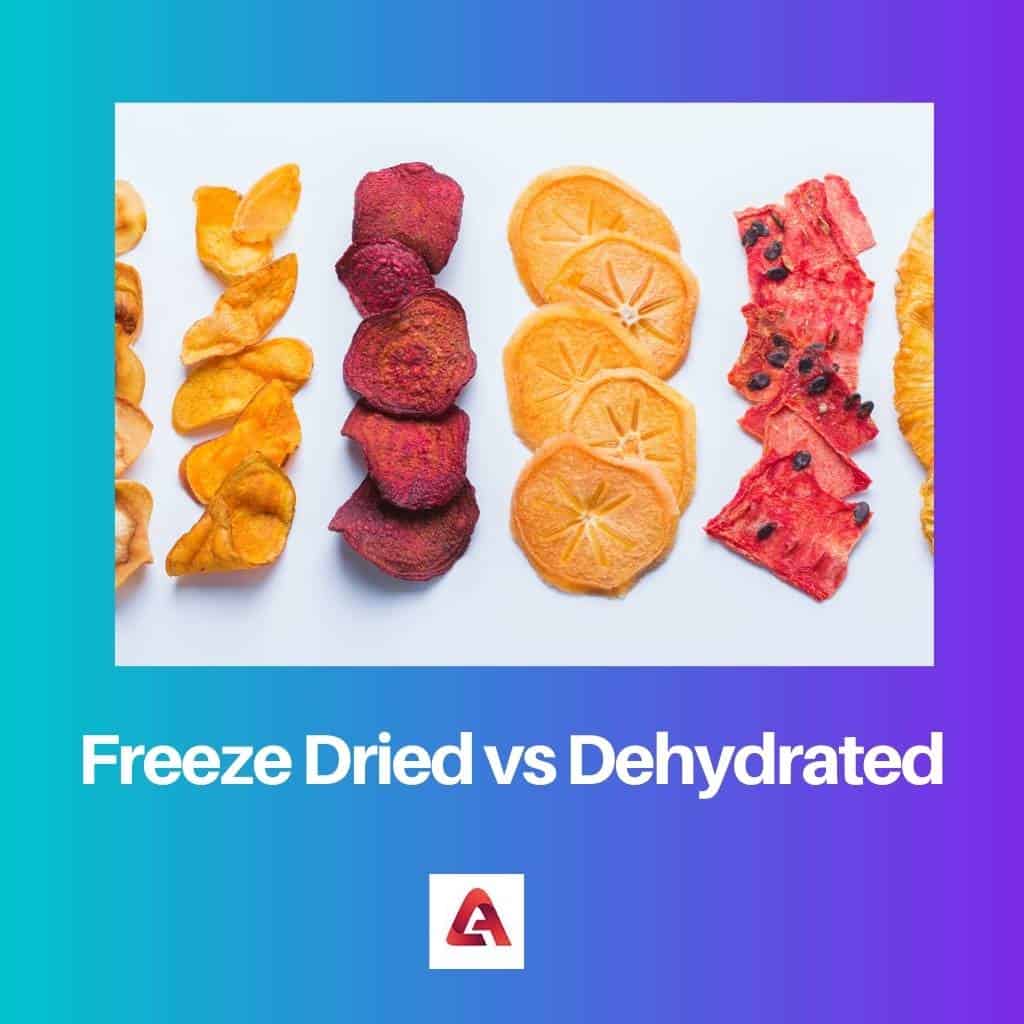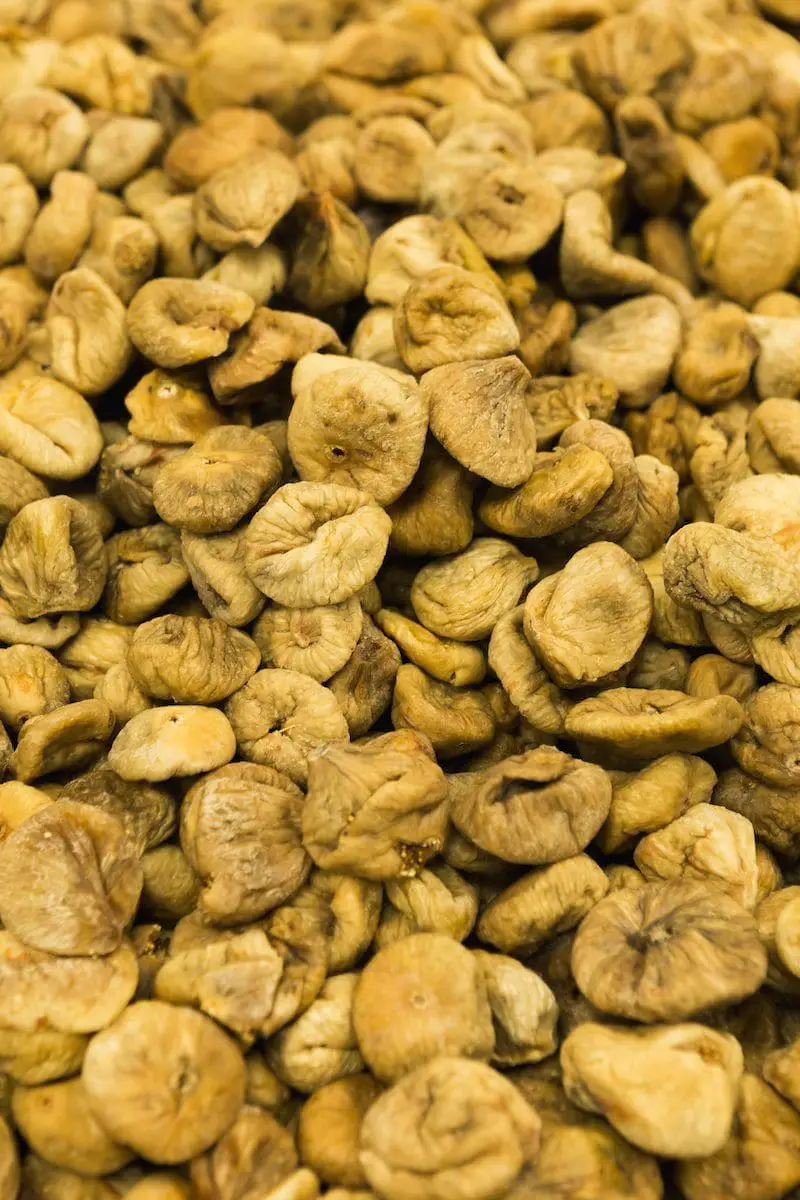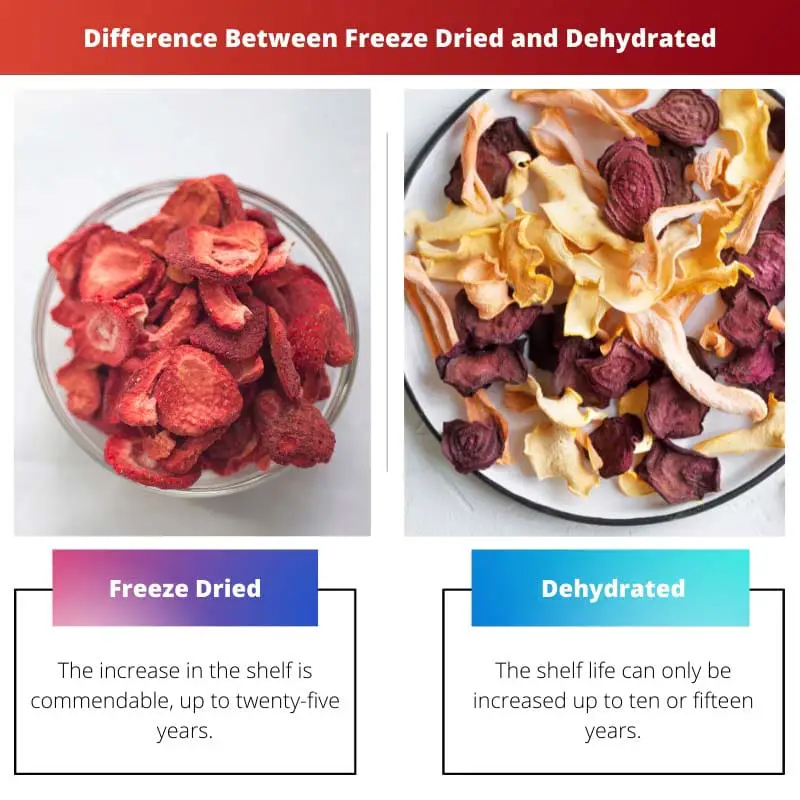It is essential to preserve food to keep it fresh for a longer duration. In case fresh food items are not stored in compliance with the storage guidelines, they might become infected with microorganisms after some time.
Therefore, preservation techniques like freeze-drying and dehydration are quite significant for the food industry. Though the purpose is identical, they are quite different in terms of the preservation methodology employed.
Key Takeaways
- Freeze-dried and dehydration are both methods of removing moisture from food, but freeze-drying involves freezing the food first and then removing the ice. In contrast, dehydration involves removing moisture through heat.
- Freeze-dried food retains more of its original flavor, texture, and nutritional value, while dehydrated food is more compact and easier to store.
- Freeze-dried food is more expensive than dehydrated food.
Freeze Dried vs Dehydrated
The difference between freeze-dried and dehydrated is that the former is more reliable than the latter in terms of increasing the shelf life of a particular food item. Though they might sound similar due to the result, the steps involved in freeze drying and dehydration are opposite.

Freeze drying means preserving food by applying a very low temperature (close to the freezing point at times) and subsequently reducing the pressure. It is an industrial method that is quite successful in maintaining food quality for more than two decades at a stretch.
It is a bit costlier than dehydration.
Dehydrated means food with reduced moisture content to increase its shelf life to a considerable extent. The etymology also favors the methodology applied during dehydration – “de” means removal, and “hydrate” means hydrous or innate water content.
It can be performed in an easier way as no complex machinery is required for extracting moisture from commonly used eatables. It is also known as curing, as it cures quality.
Comparison Table
| Parameters of Comparison | Freeze Dried | Dehydrated |
|---|---|---|
| Increase in Shelf Life | The increase in the shelf is commendable, up to twenty-five years | The shelf life can only be increased up to ten or fifteen years |
| Other Names | It is also known by two scientific terms – one is cryodesiccation while the other is lyophilization | Curing is the other general name for dehydration |
| Discovery of Method | The process of freeze drying for discovered in modern times, around 1906 | Dehydration has been in practice for a long time and was first introduced in the fifteenth century |
| Temperature Quotient | A lower temperature quotient is required for the process of freeze drying | The process of dehydration can only be completed at relatively high temperatures |
| Applications in Food Industry | Food products like fruits and chocolates can easily be freeze dried | Food products like fish and fresh vegetables can easily be dehydrated |
What is Freeze Dried?
Freeze-dried means the passage of food through immense pressure and a relatively low temperature to seal the freshness for a long duration of time.
The process is quite expensive and quick – food is completely frozen and then immediately subjected to vacuum pressure which removes the ice residue by the process of sublimation.
The initial setup is a bit gruesome but the consistency makes it more reliable than any other type of food preservation method. It is essential because the cost-effectiveness is high – a small amount spent in the initial stages can lead to high-quality food preservation measures.
There is no risk to the health of the consumer as no preservatives are added during the process.
Freeze drying finds application in upskilling the dry fruits industry and several chocolate manufacturing units, including raisins and other nuts. Ice creams are widely made using the process of freeze drying to reduce the reliance on synthetic preservatives.

What is Dehydrated?
Dehydrated means food that has been subjected to rigorous heating so that all the moisture is extracted, ultimately leading to preservation for up to fifteen years. Though it is more feasible than freeze drying, the addition of preservatives reduced its efficacy.
The benefits of dehydration include low prices and easy storage.
It is essential because not all food industries can afford the setup for freeze drying.
Dehydration is not possible unless the food is boiled or cooked partially. It is disregarded by health experts because the nutritional value is reduced as a result of subjection to high temperatures, even soaring to the boiling point.
Evaporation also plays an essential role in this method, as a result of which the weight of the food items is also reduced considerably.
Once the food item is preserved, the method employed formerly can easily be determined from the remaining freshness and tenderness. Dehydration finds application in increasing the life span of leafy veggies and meat.
Fish and other seafood can also be preserved using this reliable method.

Main Differences Between Freeze Dried And Dehydrated
- On freeze drying, the shelf life of the product is considerably enhanced for up to twenty-five years. Dehydration measures increase the shelf life up to one decade only.
- Freeze drying is also referred to as cryodesiccation and lyophilization for industrial usage while dehydrated food is simply regarded as cured food.
- As far as the discovery of food preservation methods is concerned, freeze-drying was discovered after industrialization while dehydration dates back to ancient times when there were practically no refrigeration techniques available.
- The temperature is normally kept quite low for the process of freeze drying, but a high temperature is necessary to bring dehydration into effect.
- The various applications of freeze-drying include preserving chocolates and fruits. On the other hand, dehydration is suitable for fresh vegetables and non-vegetarian food products like fish.

- https://www.sciencedirect.com/science/article/pii/S0260877498000314
- https://journals.sagepub.com/doi/abs/10.1177/036354659202000521

These preservation techniques are indeed pivotal in the food industry. Both freeze-drying and dehydration offer unique benefits in extending the shelf life of food items.
The comparison table helps to distinguish the key differences between freeze-dried and dehydrated food products.
I agree, the lower temperature requirement in freeze-drying is particularly noteworthy.
The distinct processes of freeze drying and dehydration offer valuable insights into addressing the diverse needs of food storage and sustainability.
The nutritional implications of preservation techniques underscore the importance of considering food quality and consumer health.
Understanding the trade-offs between cost, nutritional value, and preservation efficacy in different food preservation methods is essential for informed decision-making in the industry.
The cost-effectiveness of freeze-dried food preservation, despite the initial setup requirements, underscores its long-term advantages for food storage.
The impact of preservation methods on food quality and nutritional content merits further exploration to optimize food processing techniques.
Understanding the scientific principles behind freeze-dried and dehydrated food processing is essential for informed decision-making in the food industry.
The debate between freeze-dried and dehydrated food preservation highlights the complexities in balancing technological advancements and natural food processing.
The differences in temperature requirements and shelf life between freeze-dried and dehydrated foods reflect their unique contributions to food preservation methodologies.
Exploring the technological innovations in preservation methods sheds light on their role in modern food production.
The application of freeze drying in enhancing the quality of food products such as dry fruits and chocolates highlights the technological advancements in the food industry.
The historical context of dehydration’s introduction emphasizes its enduring role in food preservation practices.
The long-term implications of preservation techniques on food industry sustainability warrant thorough consideration.
The nuances between freeze-drying and dehydration are crucial for understanding their distinct impact on food preservation and quality.
The realization of how freeze-dried and dehydrated foods differ in their shelf life is enlightening.
Indeed, the preservation mechanisms employed by both methods illustrate their significance in the food industry.
The historical evolution of preservation methods underscores the continuous advancements in food industry practices.
The implications of preservation techniques in minimizing reliance on synthetic preservatives are essential for promoting natural and high-quality food products.
The versatility of preservation methods in food industries offers a foundation for sustainable and innovative practices.
The scientific and technological facets of food preservation methods should be integrated into food industry regulations and standards.